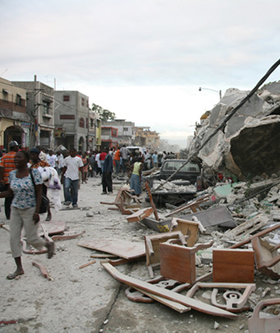Anyone who believes that the United States is immune to radical politics never attended a lecture by Howard Zinn.I first encountered Professor Zinn's work a few years ago while researching American foreign policy. His pull-no-punches assessment of US imperial ambition struck a chord in me.The rooms would be packed to the rafters, as entire families, black, white and brown, would arrive to hear their own history made humorous as well as heroic. "What matters is not who's sitting in the White House. What matters is who's sitting in!" he would say with a mischievous grin. After this casual suggestion of civil disobedience, the crowd would burst into laughter and applause.
Only Howard could pull that off because he was entirely authentic. When he spoke against poverty it was from the perspective of someone who had to work in the shipyards during the Great Depression. When he spoke against war, it was from the perspective of someone who flew as a bombardier during World War II, and was forever changed by the experience. When he spoke against racism it was from the perspective of someone who taught at Spelman College during the civil rights movement and was arrested sitting in with his students.And of course, when he spoke about history, it was from the perspective of having written A People's History of the United States, a book that has sold more than two million copies and changed the lives of countless people. Count me among them. When I was 17 and picked up a dog-eared copy of Zinn's book, I thought history was about learning that the Magna Carta was signed in 1215. I couldn't tell you what the Magna Carta was, but I knew it was signed in 1215. Howard took this history of great men in powdered wigs and turned it on its pompous head.In Howard's book, the central actors were the runaway slaves, the labor radicals, the masses and the misfits. It was history writ by Robin Hood, speaking to a desire so many share: to actually make history instead of being history's victim.Howard was asked once whether his praise of dissent and protest was divisive. He answered beautifully: "Yes, dissent and protest are divisive, but in a good way, because they represent accurately the real divisions in society. Those divisions exist - the rich, the poor - whether there is dissent or not, but when there is no dissent, there is no change. The dissent has the possibility not of ending the division in society, but of changing the reality of the division. Changing the balance of power on behalf of the poor and the oppressed."
I read more Zinn, including his seminal work, A People's History of the United States. But it was wasn't until I read Zinn's autobiography, You Can't Be Neutral on a Moving Train, that he became a hero for me. In it he describes his time teaching in the 1950's at Spelman College, an all-girls school for blacks in Georgia. It was there that he began his activism, empowering students by leading civil rights marches and sit-ins. Eventually he was fired from his post: Insubordination. From there he took a position teaching history at Boston University. He became an active leader in the Vietnam War protests, he marched for women's rights, and rights for workers. He also wrote about his role as a teacher of history. He taught that history is an interpretation of events past, therefore it is inherently biased. Each year he would tell his students that the history he taught was his interpretation, it came with his bias. As a teacher of history myself I understood what Zinn was saying. Any time you teach history you are teaching an interpretation of history. His honesty and straightforwardness were refreshing, and inspired me to view history in a new light.
Right up until his death (he suffered a heart attack while swimming during a speech tour) Zinn continued his life's work:
One of Zinn's last public writings was a brief essay, published in The Nation, a weekly American journal, about the first year of the Obama administration. "I've been searching hard for a highlight,'' he wrote, adding that he was not disappointed because he never expected a lot from Obama. "I think people are dazzled by Obama's rhetoric, and that people ought to begin to understand that Obama is going to be a mediocre president which means, in our time, a dangerous president unless there is some national movement to push him in a better direction.''Ultimately Zinn was an agitator. Unapologetically. Proudly. Men like Zinn will never be accepted by the mainstream - those in power - because they threaten their grasp of the reins. These men will always be cast as outsiders, cranks, operating on the fringe.
But for millions, worldwide, including me, this man continues to inspire.
"My hope is that you will not be content just to be successful in the way our society measures success; that you will not obey the rules, when the rules are unjust; that you will act out the courage that I know is in you."
- Howard Zinn (1922-2010)
















